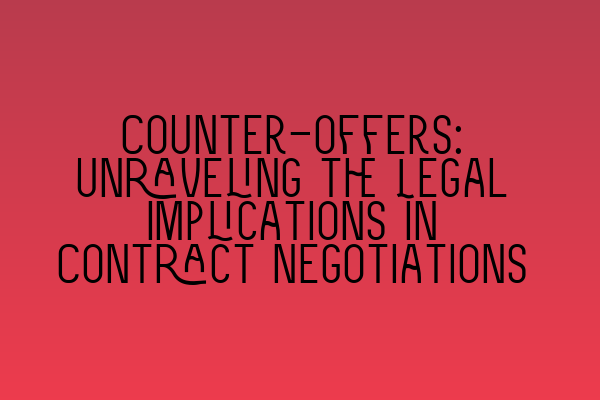Counter-offers: Unraveling the Legal Implications in Contract Negotiations
In the world of contract law, negotiations are a common occurrence. Parties engage in back-and-forth discussions, trying to reach an agreement that satisfies their respective interests. Often, this process involves making offers and counter-offers. While counter-offers may seem like a simple response to an initial offer, they have significant legal implications that both solicitors and individuals involved in contract negotiations should be aware of.
What is a Counter-offer?
A counter-offer is a response to an initial offer made during contract negotiations. It is a new proposal that alters the terms of the original offer. When a party receives an offer, they have the option to counter-offer by proposing different terms and conditions. In other words, a counter-offer acts as both a rejection of the original offer and the introduction of a new offer.
For example, let’s say Company A offers to purchase 100 units of a product from Company B for $10,000. Instead of accepting the offer, Company B counter-offers by proposing to sell 150 units for $12,000. This counter-offer creates a new negotiation starting point, opening the door for further discussions.
Legal Ramifications of Counter-offers
Counter-offers have important legal implications that impact the formation of a contract. When a party counter-offers, their response serves as a rejection of the original offer. This means that the original offer is no longer on the table and cannot be accepted as-is.
In legal terms, a counter-offer terminates the original offer and creates a new offer. This principle is known as the “mirror image rule” because a valid acceptance of an offer must be a mirror image of that offer. If any terms are changed in the counter-offer, it is no longer a mirror image, and acceptance of the counter-offer creates an entirely new contract.
Using the previous example, if Company A receives the counter-offer from Company B and chooses to accept it, a new contract for the sale of 150 units for $12,000 is formed. The original offer to purchase 100 units for $10,000 is no longer valid.
Multiple Counter-offers and Revocation
In some cases, negotiations may involve multiple counter-offers going back and forth between the parties. Each counter-offer terminates the previous offer and creates a new one. However, it’s important to note that any counter-offer can be revoked at any time before it is accepted by the other party.
Once a party receives a counter-offer, they have the choice to accept it, reject it, or counter-offer again. However, if they choose to accept the counter-offer, they need to communicate their acceptance to the other party. Until acceptance is communicated, either verbally or in writing, the counter-offer can be revoked by the offering party.
In the context of negotiations, it’s crucial for solicitors and individuals involved to keep track of each offer and counter-offer to ensure clarity and avoid any misunderstandings.
The Importance of Counter-offers in Contract Negotiations
Counter-offers play a significant role in contract negotiations. They allow parties to express their interests and propose terms that better align with their needs. Through counter-offers, negotiations can progress towards a mutually beneficial agreement.
Moreover, counter-offers can help in identifying areas of disagreement and enabling parties to find common ground. By presenting counter-offers, parties signal their willingness to negotiate and explore alternative options, potentially bridging any gaps that exist between the initial offers.
Conclusion
Understanding the legal implications of counter-offers in contract negotiations is vital for solicitors and individuals engaging in these discussions. Counter-offers act as rejections of initial offers, creating new negotiation starting points. Each counter-offer terminates the previous offer and can be revoked before acceptance. By utilizing counter-offers effectively, parties can navigate the negotiation process and work towards a mutually beneficial agreement.
If you found this article helpful, you may also be interested in the following related articles:
